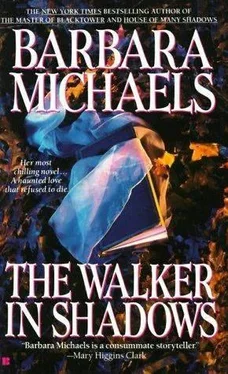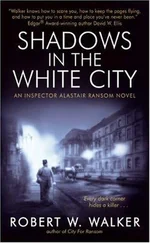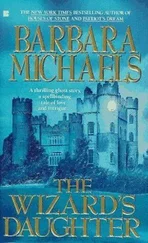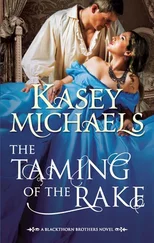Barbara Michaels - The Walker in Shadows
Здесь есть возможность читать онлайн «Barbara Michaels - The Walker in Shadows» весь текст электронной книги совершенно бесплатно (целиком полную версию без сокращений). В некоторых случаях можно слушать аудио, скачать через торрент в формате fb2 и присутствует краткое содержание. Жанр: Триллер, на английском языке. Описание произведения, (предисловие) а так же отзывы посетителей доступны на портале библиотеки ЛибКат.
- Название:The Walker in Shadows
- Автор:
- Жанр:
- Год:неизвестен
- ISBN:нет данных
- Рейтинг книги:5 / 5. Голосов: 1
-
Избранное:Добавить в избранное
- Отзывы:
-
Ваша оценка:
- 100
- 1
- 2
- 3
- 4
- 5
The Walker in Shadows: краткое содержание, описание и аннотация
Предлагаем к чтению аннотацию, описание, краткое содержание или предисловие (зависит от того, что написал сам автор книги «The Walker in Shadows»). Если вы не нашли необходимую информацию о книге — напишите в комментариях, мы постараемся отыскать её.
The Walker in Shadows — читать онлайн бесплатно полную книгу (весь текст) целиком
Ниже представлен текст книги, разбитый по страницам. Система сохранения места последней прочитанной страницы, позволяет с удобством читать онлайн бесплатно книгу «The Walker in Shadows», без необходимости каждый раз заново искать на чём Вы остановились. Поставьте закладку, и сможете в любой момент перейти на страницу, на которой закончили чтение.
Интервал:
Закладка:
"Such a waste," she murmured.
"War always wastes the young first, " Josef said. "And back then boys grew up to adult responsibilities earlier than they do today."
Pat looked at him suspiciously, wondering if this was meant as a slur on Mark, but Josef's face was serious, without visible malice, as he went on, "The same thing happened in this century, in World War Two; toward the end our men were fighting boys of fourteen and fifteen- the Hitler Youth. And, my dear, lest you take it too hard, I might add that the young ones are sometimes the most vicious and intolerant of all soldiers."
Leafing through the pages, Pat came upon photographs of survivors of the prison camps, Northern and Southern. They reminded her of World War Two atrocity pictures. She closed the book.
"Horrible. Why do men-"
"This is no time for a debate on ethics," Mark said impatiently. "Don't you see what it means? The two families were divided-violently divided. Can you imagine what it must have been like, living right next door to each other-two sisters, once devoted-and their sons fighting on opposite sides? Don't tell me that wasn't a tragedy."
He and Josef continued to talk. Pat paid no attention. The faces of the long-dead children in uniform-they were no more than children, some of them-had given the case a human immediacy it had never had before. The idea of the two women waiting for news from the battlefield, news of beloved young sons, wrenched her heart. They could not even console one another; loyalty to their husbands and the causes they espoused would alienate them. The gun aimed at one boy might be held by the other's hands…
"Did they survive?" she asked.
"Who?" Interrupted in midsentence, Mark blinked at her.
"The boys. Peter Turnbull and the Bates boy."
"Edward," Mark said. "You mean did they survive the war? Edward did. According to the genealogy he died in nineteen-something." He reached for another book, a thin, limp volume bound pretentiously in brown calf. Pat caught a glimpse of the title. "Morton Genealogy," she said, in surprise. "I thought-"
"Morton was the name of the man Susan Bates married," Mark explained. "This was written, and privately printed, by her son. He was more interested in the Morton family, so there isn't much about the Bateses."
"I wonder," Pat began, and then stopped. No need to wonder where the book had come from; Jerry was always picking up used books in secondhand bookstores, or sending away for them. He had received a small box of books a few days before he died.
"Here it is," Mark said, leafing through the genealogy. "Edward Bates, born 1845, died 1915. A ripe old age. And here is a picture of his father, John Bates."
The portrait, waist-length, showed a man wearing a dark suit, his hands folded. The stiff points of his white collar, which was encircled by a broad neckcloth, jabbed into his cheeks. Heavy horizontal creases disfigured his forehead, but all the other lines in his face were severely vertical, even to the cleft in his protruding, prominent chin. The dark hair, which had retreated from his brow, stuck out in luxuriant tufts on either side of his face. It was an uncompromising face, Pat thought, and yet there was something rather attractive about the steady dark eyes, and the shape of the full lips belied the rigidity of their setting.
Pat reached out and turned the page. Mark had mentioned seeing portraits of the two Peters girls, and here they were: arms around each other's waists, simpering at the camera. They must have been in their early thirties when the picture was taken, for if the families had indeed split over political issues it was unlikely that the sisters would have been shown together in such amity after the late 1850's. In truth they did not look much like sisters; Louisa was at least thirty pounds heavier than Lavinia, but it was not only extra weight that broadened her cheeks and gave her face the gentle, maternal look Mark had described. Lavinia was more elaborately dressed and bedecked with jewelry-heavy earrings, bracelets, brooches, and chains. Her hairstyle was a bit too girlish for a face that was already slightly haggard.
Pat handed the book to Josef, who waved it away.
"I've seen it-and the other books as well. This is fine, Mark, as far as it goes; but it doesn't really go very far. All you've proved is that the families disagreed. What the hell have you got that ties this situation, potentially tragic as it may have been, to our poltergeist?"
Before his critical stare Mark's eyes fell. He scraped up chocolate icing with his forefinger, and licked it.
"Just a hunch," he muttered. "But give me time. I'll prove it."
II
At midnight they took up their positions, but not until after there had been a heated argument. Kathy wanted to be near her father. Why couldn't she stay in another room of the house, or at least in the apple tree outside the window? The others unanimously rejected both suggestions, arguing that Kathy's proximity would negate the experiment. To Pat the discussion had an element of sick humor. How did one calculate the geographical limitations of a ghost? Eventually Kathy agreed to remain inside the Robbins house, provided Pat stayed with her.
As soon as the men left, Kathy bolted for the stairs. Pat was right behind her. She lost ground as she climbed- Kathy was younger and in better condition-but reached Mark's window in time to see her son and Josef pass through the gate of the house next door.
Since the houses were mirror images of one another, Mark's corner room directly faced the windows of Kathy's bedroom. From that height they could see over the fence and into the backyard. Kneeling, her forehead pressed against the screen, Kathy gripped the sill with clenched hands.
"You can't stay in that position for an hour," Pat said. "Pull up a chair and make yourself comfortable."
Kathy ignored her; so, with a shrug, Pat followed her own advice. However, her heart was beating fast and her stomach felt queasy. Her view of the two tall figures had been both comical and touching; the slight suggestion of bravado in the swaggering walks, the false implication of comaraderie in the face of danger… They had known that their womenfolk would be watching.
The sound of distant revelry, from neighbors entertaining and being entertained, came faintly to Pat's ears. However, the noise was not loud enough to cover the sound of the front door in the neighboring house when it opened and closed again. Mark came around the corner of the house and disappeared behind the shrubbery. Then they saw him again at the base of the apple tree. The blossoms were fading, and the leaves were young; it was possible to follow his progress as he climbed. When he reached the branch nearest to Kathy's window he was clearly visible, though only in outline. The black shape shot out an arm which waved vigorously; then it settled down, its back against the tree trunk, and remained motionless.
"How much longer?" Kathy whispered.
Pat answered in the same low tone, though there was really no need for quiet. "About fifty minutes."
They had agreed on the time, if on nothing else. It had been a few minutes after one a.m. when Pat burst into the house in response to Kathy's shrieks. Mark had been careful to note the time of the next demonstration. One of the strongest points in favor of his theory was the coincidence in time-one a.m., almost to the minute.
The wait seemed a good deal longer than fifty minutes. For someone who paid little attention to the dictates of time and schedules, Mark had a passion for clocks. Several of them shone in the dark. The two women followed the crawling progress of the faint green streaks of the hands with disbelief. Long before they came close together, at the top of the dials, Pat was kneeling on the floor beside Kathy.
Читать дальшеИнтервал:
Закладка:
Похожие книги на «The Walker in Shadows»
Представляем Вашему вниманию похожие книги на «The Walker in Shadows» списком для выбора. Мы отобрали схожую по названию и смыслу литературу в надежде предоставить читателям больше вариантов отыскать новые, интересные, ещё непрочитанные произведения.
Обсуждение, отзывы о книге «The Walker in Shadows» и просто собственные мнения читателей. Оставьте ваши комментарии, напишите, что Вы думаете о произведении, его смысле или главных героях. Укажите что конкретно понравилось, а что нет, и почему Вы так считаете.












